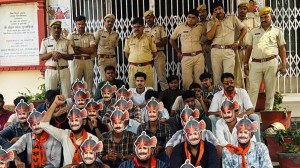Five PEC students to take part in US rocket science competition next month
Kashish was just 18 years old and in the first year of his bachelors degree in Aerospace Engineering in 2015 when he started work on design and fabrication of the hybrid-propellant rocket.
 Kashish Korotania at PEC. Express
Kashish Korotania at PEC. Express
TWO YEARS ago when Kashish Korotania joined PEC University of Technology, the 20-year-old just wanted to learn designing and fabrication of business jets. Come June 20, Kashish and his four friends will become the first team of students from India to launch a hybrid-propellant, two-stage sounding rocket and participate in the most advanced category of Intercollegiate Rocket Engineering Competition (IREC) in the United States.
Kashish was just 18 years old and in the first year of his bachelors degree in Aerospace Engineering in 2015 when he started work on design and fabrication of the hybrid-propellant rocket as an intern at Engenious Aerospace Limited in Mumbai. Otherwise an aeromodelling enthusiast, Kashish said the hybrid rocketing soon became his dream project. “My mentor last year told me about the sounding rocket competition and the idea of participating in it came there because the company’s project was already there… to design and develop this hybrid technology, to fabricate it and then launch it,” said Kashish.
After hearing about the competition, Kashish informed his two friends Anand Parinam and Anol Kumar in April 2016 about his desire to participate in it. Soon, two other students, Lovleen Arora and Bhavya Jalan, joined in and a proposal for participation in the annual international competition was put before the university authorities.
“I proposed the project to my friends and then to our department head. He was very excited but nervous too at the same moment. He just asked us to pursue it and said he is with us. He said he will aide and mentor us in every possible manner,” said Kashish, leader of the student group called Team Vigyaan.
It would take five months and continuous efforts of Team Vigyaan to convince the university to allow them to participate in the IREC, which is the world’s largest sounding rocket engineering competition for students and will see a participation of 115 teams from across the world. Team Vigyaan is participating in the most advanced category which is aiming a target to deploy a minimum of 4 kg of payload at an altitude of 9.144 km (30,000 ft) using a high-power sounding rocket. The team would compete with 15 teams in this category.
In April 2017, the university finally gave them approval but only promised a contribution of Rs 2.5 lakh for the project estimated to cost Rs 15 lakh. The team did not lose hope but went looking for sponsorship, soon bringing in Rs 8 lakh from copper-alloy tube producer Kamani Tubes and Rs 1 lakh from Chek Machin-o-fab, a manufacturing company from Mumbai. “Chek Machin-o-fab is also assisting us in the fabrication process with in-kind support from Godrej Aerospace,” said Kashish. “The rest has to be filled from our own pockets. We had approached other companies like Air India and Paytm but did not receive a positive response.”
The students have now started an online campaign on IndieGoGo to raise money through crowdsourcing to fill the gap. “We have the competent design and correct guidance to excel at this competition but still, need financial help to make this a reality,” reads a message from the team.
Team Vigyaan completed the design part of the project in February and expects to complete all the stages of fabrication before the end of this month to be ready for the competition next month. “It is a very big achievement in the sense that the hybrid rocket technology has not been fully tested in India. I am proud of my students,” said Dr Rakesh Kumar, head of the Aerospace Engineering Department at PEC university.
As Team Vigyaan nears the competition date, the students are spending their days and nights on the project while also attending their internships. While Kashish is busy in fabricating the rocket, his team members are on the task of electronic circuitry and coding of the project.
- 01
- 02
- 03
- 04
- 05































